The mobile app development landscape is thriving because businesses understand the importance of an app presence for success. However, building a new app is expensive and complicated for startups, small businesses, and new programmers. Thus, mobile app development frameworks with pre-built tools and functionalization are emerging to construct an effective app faster. Since such frameworks are handy for app development, let’s discover this article’s 10 best mobile application development frameworks.
What is a Mobile App Framework?
Mobile app development frameworks are platforms or tools with pre-written codes and embedded libraries to facilitate full-scale application development. These frameworks empower developers to create a mobile app with minimal effort because they can access everything simultaneously. Therefore, they save time required for product variation, rely on best practices, and benefit from cross-platform compatibility.
Apple and Android apps dominate the global market, creating an urge to develop apps that target these two platforms. So, mobile development frameworks offer debugging tools, compilers, and programming interfaces to build applications for mobile devices with source code. You don’t need to learn computer languages when using these frameworks, but you should have enough knowledge of programming languages.
Types of a Mobile App Framework
Generally, mobile applications come in various sizes and shapes and vary in terms of how they work on smartphones. That’s why mobile app frameworks are classified into 3 main categories mentioned below, which you should study to gain valuable insights.
- Native Apps: Such apps are specifically designed for iOS and Android operating systems, offering impressive user experience. Moreover, they allow access to device-specific features but require complicated maintenance and high development costs.
- Web/Cross-Platform Apps: These apps aim to deliver web pages on different platforms regardless of devices. Additionally, they are distributed via web browser interfaces and don’t require app distribution to devices or updates.
- Hybrid App: It combines native and web applications that can be developed through a single code base with low development costs. Furthermore, these apps can target multiple platforms and prove less expensive to sell in the app stores but show slower performance.
How to Select a Reliable Cross-Platform App Development Framework?
Before exploring cross-platform app development frameworks, remember that every framework has pros and cons. Thus, you should understand which platform will be ideal for you and what you want. In this regard, the following points can help you, as they cover the factors of choosing a reliable framework.
1. Learning Curve and Scalability
First, you should pick a mobile development framework that is easy to use and functional with minimal effort. Besides, search for a framework that requires the lowest training time, and you or your team can quickly adapt. Apart from that, use a framework that can handle increasing user-base loads and integrate with backend services.
2. Community Backing and Support
Mobile application development frameworks with active and extensive users tend to receive frequent updates and bug fixes. Therefore, pick a prevalent framework that must have a strong community and robust support ecosystem so you can seek guidance.
3. Development Duration or Speed
Developers should consider the framework’s development speed, code reusability, set of pre-built components, and reloading. The faster development cycle will lead to quick marketing of products and must be easy to function afterward.
4. Attractive UI & UX and Other Features
Most importantly, you need a framework that provides the required features to build an attractive user interface to enhance the user experience and attract the maximum number of users. Also, evaluate how well the framework integrates with native devices regarding notification push, camera, sensor, GPS, or other features.
Top 10 Mobile App Development Framework
Currently, the internet is full of mobile app development frameworks that offer built-in benefits like a bug-free atmosphere and speed. Therefore, this section will cover the top 10 industry-leading development frameworks with built-in toolkits, compilers, and other pre-built elements. Using these reputable frameworks, you can create reactive and quick applications, simplifying mobile app development.
1. Flutter
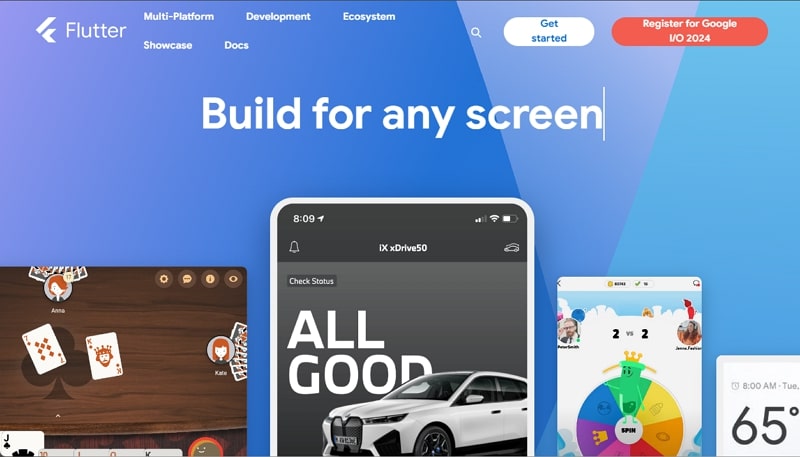
It is one of Google’s best mobile app development frameworks that aims to build natively compiled applications. Moreover, it’s an open-source framework with a vast community used to build, test, and deploy apps from a single codebase. Flutter also has cross-platform application development SDKs that provide widgets, integrate APIs, and other resources to assist developers.
Key Features
- To create beautiful apps, Flutters has a widget catalog that ranges from basic to accessible, animation, images, and icon categories.
- This mobile development framework supports pre-packed implicit animations to make your UI more intuitive.
- It allows you to create interactive apps for iOS, Android, web, embedded devices, and desktops with simple codes.
2. Ionic Framework
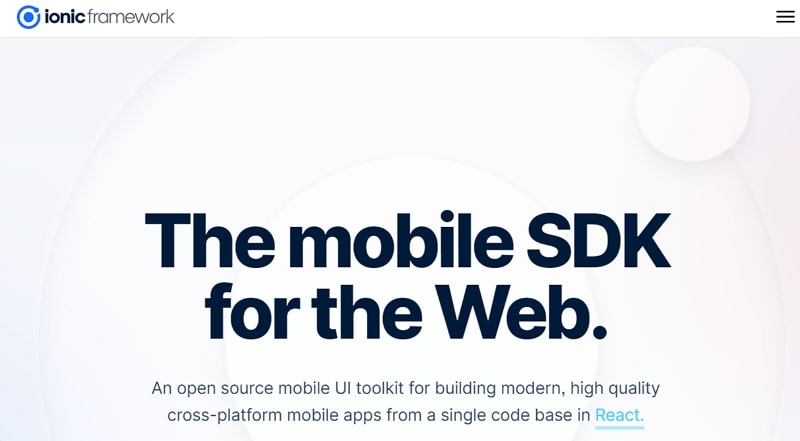
This explicit framework is well-known for enabling programmers to build operative Android and iOS applications. Additionally, it allows you to craft feature-rich progressive web apps (PWAs), cross-platform, and hybrid mobile apps. This best mobile development framework also facilitates seamless native device plugins and SDKs for cameras, file systems, maps, and Bluetooth.
Key Features
- Programmers can start with pre-built iOS and material design themes to create custom UIs that match their brand needs.
- Apart from customization, it can create blazing-fast apps with default practices such as pre-rendering and hardware-accelerated transitions.
- It offers modern UI paradigms and components such as alerts, chips, cars, lists, tabs, sliders, toggles, and checkboxes.
3. React Native
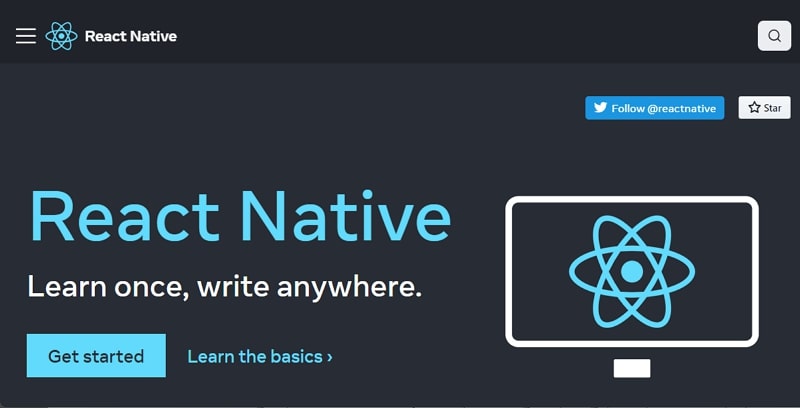
Facebook launched this cross-platform app development framework in 2015 to create iOS and Android applications, aiming to facilitate programmers in building native apps with great user interfaces. Despite that, it provides reusable elements, component-based GUI creation for front-end apps, and third-party extensions. Using React Native, you can run JavaScript code in up to 3 environments such as Hermer, JavaScriptCore, and V8.
Key Features
- This framework helps developers style UI using JavaScript and color APIs, allowing them to benefit from designs and customizations.
- Plus, this mobile development framework offers a list of components and APIs to create cross-platform applications.
- For building UI, it offers all basic components, including text, image, view, scroll view, style sheet, and text input.
You may also like: Flutter vs React Native: Which One to Choose?
4. NativeScript
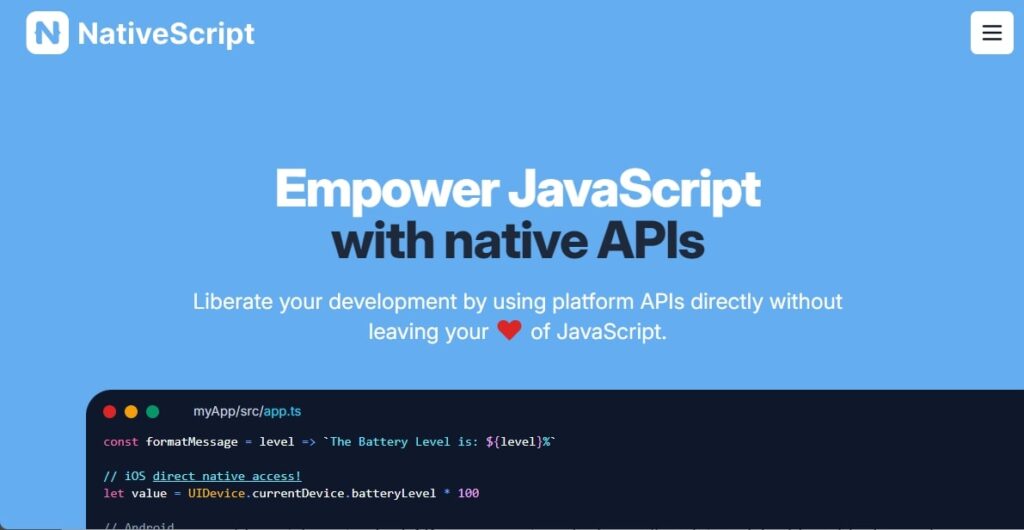
Another from the list of the best mobile app development frameworks is NativeScript, which aims to elevate your app development with APIs. Besides, it’s an open-source framework that builds native applications with Typescript, JavaScript, Vue.js, and CSS. In addition, its shared codebase helps you build iOS, Android, Web, and Vision Pro apps with portable JavaScript skills.
Key Features
- You can create your own plugins using the plugin workspace seed of NativeScript and obtain a consistent plugin source structure.
- It also has standard UI components, which are foundational building blocks, and you can create additional UI via Plugins.
- This mobile development framework improves how platform developers can work with JavaScript developers.
5. Xamarin
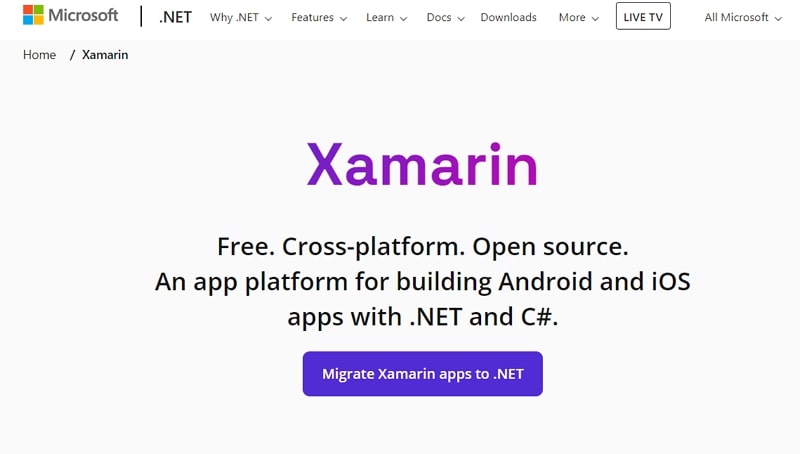
You can also consider Xamarin to be one of the best mobile development frameworks for Android and iOS apps. Notably, it employs the .NET and C# programming languages, which require fewer lines of code to make your coding process quicker. Microsoft acquired Xamarin in 2016 to deliver flawless native functionality and control the connection between standard and core system codes.
Key Features
- It’s a multi-platform framework that uses innovative technologies to create native Android, iOS, macOS, tvOS, and Windows apps.
- This mobile development framework provides reusable UI components from various top component vendors, such as Syncfusion and Telerik.
- You just need a C# codebase and project system to build apps for all devices, which means effortless app development.
6. Angular
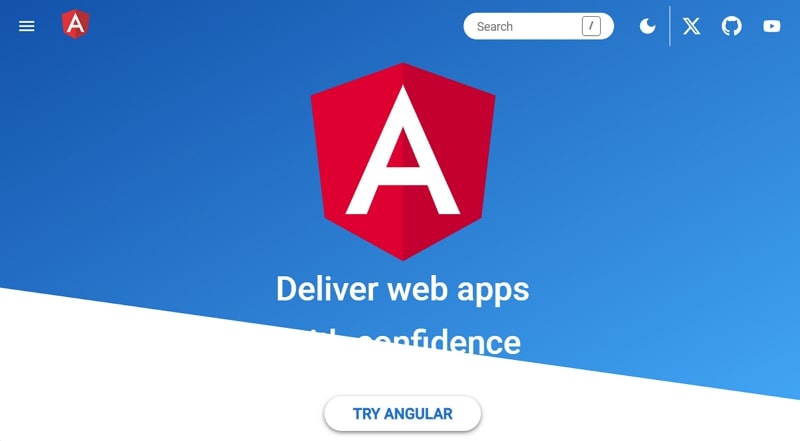
This cross-platform app development framework is designed to create efficient and sophisticated single-page apps. You can enhance your mobile app development skills with its tutorial guidelines to help start your journey. Moreover, you can access certain features and content even when PWA is built with Angular offline.
Key Features
- With this mobile development framework, you can also integrate Google Material Design components to develop a modern app.
- This framework also offers dependency injection that reduces boilerplate codes to ensure developers can maintain mobile apps easily.
- Its built-in routing system lets you handle navigation within your mobile app to smoothen the user experience.
7. Framework7
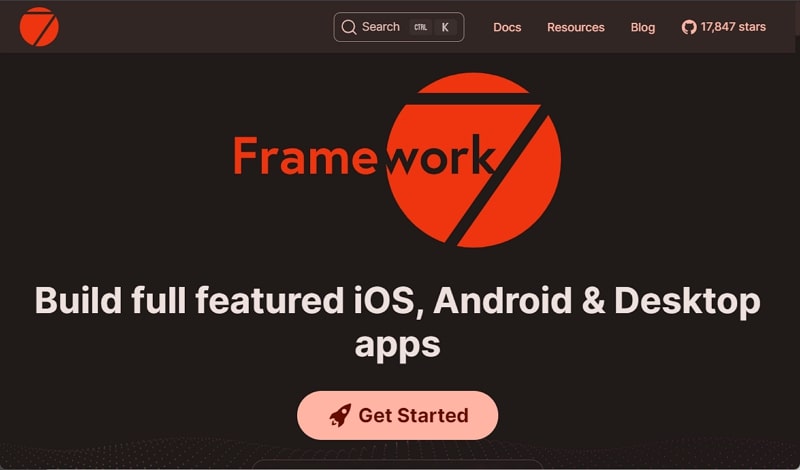
Framework7 is an open-source framework that can create mobile, website, and desktop apps with modern design. This best mobile application development framework offers you a variety of pre-built elements and widgets, such as dialogs, popups, and side panels for apps. Moreover, you can integrate Electron and NW.js to develop desktop apps with versatile features and customization options.
Key Features
- You can use this platform to integrate multiple frameworks like Vue.js, React, and Svetle to develop a responsive interface.
- Additionally, this mobile app development framework provides a prototyping tool that can work to test and refine your app ideas.
- Framework7 allows you to build apps with a fast-click library to eliminate click delays and provide an efficient user experience.
8. jQuery
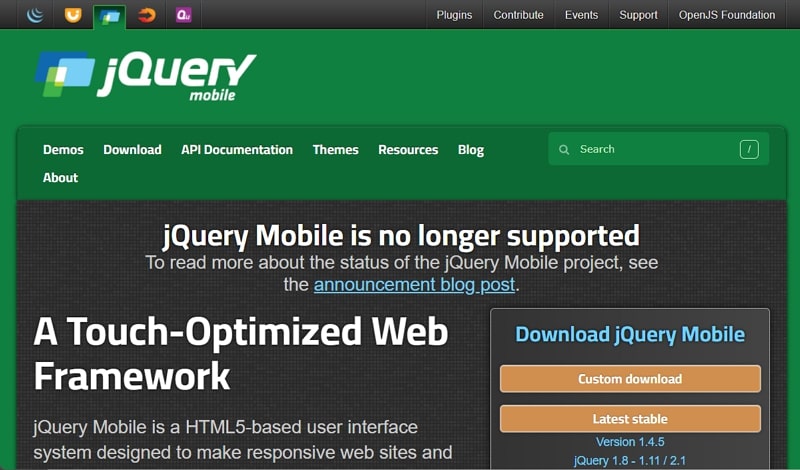
This cross-platform app development framework has a large active community that provides extensive support resources and tutorials. With jQuery, your code works consistently across different web browsers by handling browser inconsistencies. Furthermore, it simplifies Asynchronous JavaScript and XML (AJAX) requests to fetch data from the server without reloading the entire page.
Key Features
- With its smooth animation of elements, developers can improve the user experience of an app.
- jQuery has a wide range of plugins to extend your web app functionality for various tasks, such as image sliders, date pickers, etc.
- This mobile development framework offers DOM Manipulation to modify the HTML elements on a webpage to add, remove, and change content easily.
9. Sencha Touch (Merged with Ext JS)
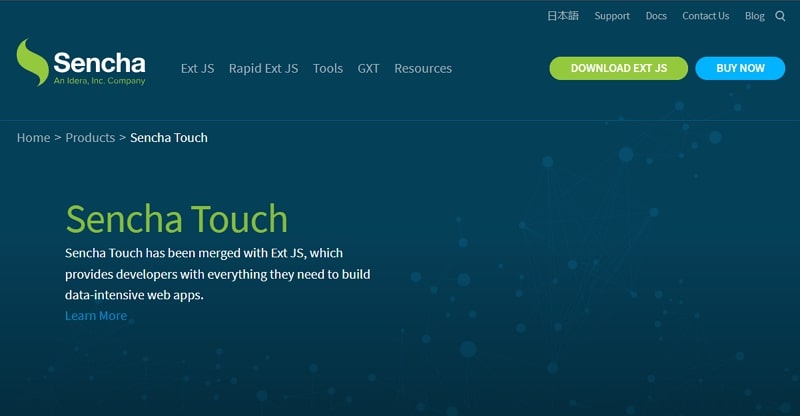
Sencha Touch allows you to integrate various third-party libraries to provide versatile possibilities to meet your speed requirements. This framework can improve code organization and maintainability with a clear separation of concerns. Besides, using this mobile application development framework is a wise choice if you crave advanced functionalities.
Key Features
- With its debugging tools, such as App Inspector and Illuminations, developers can diagnose errors and streamline development.
- What’s more, you can create unique and high-end applications with its extensive pre-built theming and customization capabilities.
- Sencha Touch offers a choice between a modern toolkit for HTML 5 or a classic toolkit to ensure a successful approach to building web applications.
10. Onsen UI
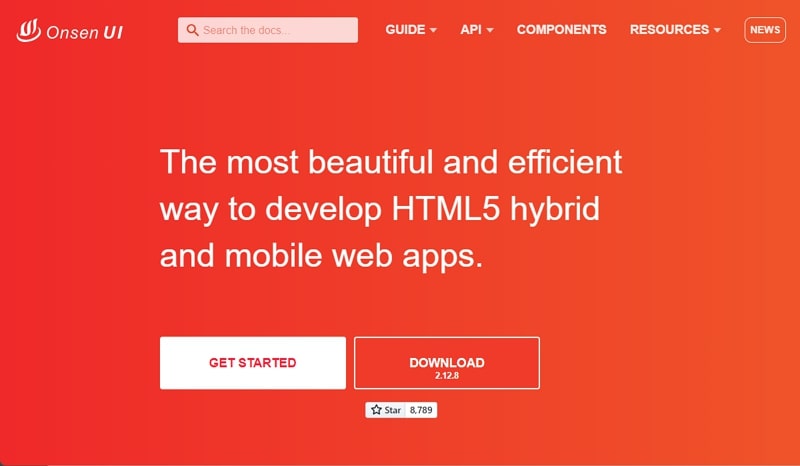
Onsen UI is a mobile app development framework offering JavaScript, HTML, and CSS to get started with your applications without a lengthy setup process. This powerful mobile development framework will help you develop smooth mobile apps, even on lower-end devices. Furthermore, you can integrate Monaca with Onsen UI to seamlessly build, test, and deploy mobile apps.
Key Features
- Developers can use automatic styling features to adjust the styling of your iOS or Android apps while reducing the need for code duplication.
- In addition, this framework has pre-built components designed specifically for mobile app developments to ensure seamless user experience across platforms.
- Onsen UI allows you to learn complex mobile app codes more simply and improve your development skills.
Enhancing Mobile App Capabilities with ZEGOCLOUD in Popular Development Frameworks
If you still haven’t found a feature-packed mobile app development framework, you can explore the SDKs and APIs of ZEGOCLOUD. This platform helps you build fully customizable UI and UX with a few lines of code suitable for developers and businesses. Moreover, it provides 20+ pre-built UIKits and 50+ UI components to create feature-rich apps based on your needs.

This open-source and cross-platform is perfect for MVP, in-app plugins, and testing tools that also prove cost-effective. Specifically, it has high-quality video call SDKs and audio call SDKs to embed in apps and utilize group calling, screen sharing, and recording features.
Key Features
- ZEGOCLOUD offers an in-app chatting API with file sharing, unread messages, group management, and offline messages features.
- It also provides live-streaming APIs with HD-quality videos at low bitrates and face beautification, live chat, and virtual avatar features.
- In your beauty-related app, you can integrate its AI effects API to add face makeup, AR stickers, filters, and background removal features.
Conclusion
To wrap up, this article explored what a mobile app development framework is, including its types and how to choose the right one. Here, you have also gained insights into the 10 best mobile app development frameworks and their main functionalities. If selecting one is difficult for you, use ZEGOCLOUD, which offers extensive APIs and SDKs for effortless app creation.
Read more:
Let’s Build APP Together
Start building with real-time video, voice & chat SDK for apps today!










